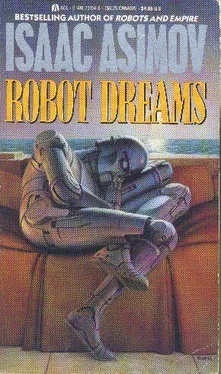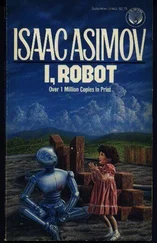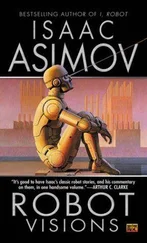Isaac Asimov - Robot Dreams
Здесь есть возможность читать онлайн «Isaac Asimov - Robot Dreams» весь текст электронной книги совершенно бесплатно (целиком полную версию без сокращений). В некоторых случаях можно слушать аудио, скачать через торрент в формате fb2 и присутствует краткое содержание. Город: New York, Издательство: Ace Books, Жанр: Фантастика и фэнтези, на английском языке. Описание произведения, (предисловие) а так же отзывы посетителей доступны на портале библиотеки ЛибКат.
- Название:Robot Dreams
- Автор:
- Издательство:Ace Books
- Жанр:
- Год:неизвестен
- Город:New York
- ISBN:нет данных
- Рейтинг книги:4 / 5. Голосов: 1
-
Избранное:Добавить в избранное
- Отзывы:
-
Ваша оценка:
- 80
- 1
- 2
- 3
- 4
- 5
Robot Dreams: краткое содержание, описание и аннотация
Предлагаем к чтению аннотацию, описание, краткое содержание или предисловие (зависит от того, что написал сам автор книги «Robot Dreams»). Если вы не нашли необходимую информацию о книге — напишите в комментариях, мы постараемся отыскать её.
Robot Dreams — читать онлайн бесплатно полную книгу (весь текст) целиком
Ниже представлен текст книги, разбитый по страницам. Система сохранения места последней прочитанной страницы, позволяет с удобством читать онлайн бесплатно книгу «Robot Dreams», без необходимости каждый раз заново искать на чём Вы остановились. Поставьте закладку, и сможете в любой момент перейти на страницу, на которой закончили чтение.
Интервал:
Закладка:
"I know, but right now I’m kind of getting ready to sign and I want it clear in my head. Is Earth set and determined to bring us to an end here?"
"Of course not. Earth is interested in conserving its irreplaceable water supply, nothing else."
"You have one and a half quintillion tons of water on Earth."
The Committee Chairman said, "We cannot spare water."
And Sankov had signed.
That had been the final note he wanted. Earth had one and a half quintillion tons of water and could spare none of it.
Now, a day and a half later, the Committee and the reporters waited in the spaceport dome. Through thick, curving windows, they could see the bare and empty grounds of Mars Spaceport.
The Committee Chairman asked with annoyance, "How much longer do we have to wait? And, if you don’t mind, what are we waiting for?"
Sankov said, "Some of our boys have been out in space, out past the asteroids."
The Committee Chairman removed a pair of spectacles and cleaned them with a snowy-white handkerchief. " And they’re returning?"
"They are."
The Chairman shrugged, lifted his eyebrows in the direction of the reporters.
In the smaller room adjoining, a knot of women and children clustered about another window. Sankov stepped back a bit to cast a glance toward them. He would much rather have been with them, been part of their excitement and tension. He, like them, had waited over a year now. He, like them, had thought, over and over again, that the men must be dead.
"You see that?" said Sankov, pointing.
"Hey!" cried a reporter. "It’s a ship!"
A confused shouting came from the adjoining room.
It wasn’t a ship so much as a bright dot obscured by a drifting white cloud. The cloud grew larger and began to have form. It was a double streak against the sky, the lower ends billowing out and upward again. As it dropped still closer, the bright dot at the upper end took on a crudely cylindrical form.
It was rough and craggy, but where the sunlight hit, brilliant highlights bounced back.
The cylinder dropped toward the ground with the ponderous slowness characteristic of space vessels. It hung suspended on those blasting jets and settled down upon the recoil of tons of matter hurling downward like a tired man dropping into his easy chair.
And as it did so, a silence fell upon all within the dome. The women and children in one room, the politicians and reporters in the other remained frozen, heads craned incredulously upward.
The cylinder’s landing flanges, extending far below the two rear jets, touched ground and sank into the pebbly morass. And then the ship was motionless and the jet action ceased.
But the silence continued in the dome. It continued for a long time.
Men came clambering down the sides of the immense vessel, inching down, down the two-mile trek to the ground, with spikes on their shoes and ice axes in their hands. They were gnats against the blinding surface.
One of the reporters croaked, "What is it?"
"That," said Sankov calmly, "happens to be a chunk of matter that spent its time scooting around Saturn as part of its rings. Our boys fitted it out with travel-head and jets and ferried it home. It just turns out the fragments in Saturn’s rings are made up out of ice."
He spoke into a continuing deathlike silence. "That thing that looks like a spaceship is just a mountain of hard water. If it were standing like that on Earth, it would be melting into a puddle and maybe it would break under its own weight. Mars is colder and has less gravity, so there’s no such danger.
"Of course, once we get this thing really organized, we can have water stations on the moons of Saturn and Jupiter and on the asteroids. We can scale in chunks of Saturn’s rings and pick them up and send them on at the various stations. Our Scavengers are good at that sort of thing.
"We’ll have all the water we need. That one chunk you see is just under a cubic mile – or about what Earth would send us in two hundred years. The boys used quite a bit of it coming back from Saturn. They made it in five weeks, they tell me, and used up about a hundred million tons. But, Lord, that didn’t make any dent at all in that mountain. Are you getting all this, boys?"
He turned to the reporters. There was no doubt they were getting it.
He said, "Then get this, too. Earth is worried about its water supply. It only has one and a half quintillion tons. It can’t spare us a single ton out of it. Write down that we folks on Mars are worried about Earth and don’t want anything to happen to Earth people. Write down that we’ll sell water to Earth. Write down that we’ll let them have million-ton lots for a reasonable fee. Write down that in ten years, we figure we can sell it in cubic-mile lots. Write down that Earth can quit worrying because Mars can sell it all the water it needs and wants."
The Committee Chairman was past hearing. He was feeling the future rushing in. Dimly he could see the reporters grinning as they wrote furiously.
Grinning.
He could hear the grin become laughter on Earth as Mars turned the tables so neatly on the anti-Wasters. He could hear the laughter thunder from every continent when word of the fiasco spread. And he could see the abyss, deep and black as space, into which would drop forever the political hopes of John Hilder and of every opponent of space flight left on Earth – his own included, of course.
In the adjoining room, Dora Swenson screamed with joy, and Peter, grown two inches, jumped up and down, calling, "Daddy! Daddy!"
Richard Swenson had just stepped off the extremity of the flange and, face showing clearly through the clear silicone of the headpiece, marched toward the dome.
"Did you ever see a guy look so happy?" asked Ted Long. "Maybe there’s something in this marriage business."
"Ah, you’ve just been out in space too long," Rioz said.
Franchise
Linda, age ten, was the only one of the family who seemed to enjoy being awake.
Norman Muller could hear her now through his own drugged, unhealthy coma. (He had finally managed to fall asleep an hour earlier but even then it was more like exhaustion than sleep.) She was at his bedside now, shaking him. "Daddy, Daddy, wake up. Wake up!"
He suppressed a groan. "All right, Linda."
"But, Daddy, there’s more policemen around than any time! Police cars and everything!"
Norman Muller gave up and rose blearily to his elbows. The day was beginning. It was faintly stirring toward dawn outside, the germ of a miserable gray that looked about as miserably gray as he felt. He could hear Sarah, his wife, shuffling about breakfast duties in the kitchen. His father-in-law, Matthew, was hawking strenuously in the bathroom. No doubt Agent Handley was ready and waiting for him.
This was the day.
Election Day!
To begin with, it had been like every other year. Maybe a little worse, because it was a presidential year, but no worse than other presidential years if it came to that.
The politicians spoke about the guh-reat electorate and the vast electronic intelligence that was its servant. The press analyzed the situation with industrial computers (the New York Times and the St. Louis Post-Dispatch had their own computers) and were full of little hints as to what would be forthcoming. Commentators and columnists pinpointed the crucial state and county in happy contradiction to one another.
The first hint that it would not be like every other year was when Sarah Muller said to her husband on the evening of October 4 (with Election Day exactly a month off), "Cantwell Johnson says that Indiana will be the state this year. He’s the fourth one. Just think, our state this time."
Matthew Hortenweiler took his fleshy face from behind the paper, stared dourly at his daughter and growled, "Those fellows are paid to tell lies. Don’t listen to them."
Читать дальшеИнтервал:
Закладка:
Похожие книги на «Robot Dreams»
Представляем Вашему вниманию похожие книги на «Robot Dreams» списком для выбора. Мы отобрали схожую по названию и смыслу литературу в надежде предоставить читателям больше вариантов отыскать новые, интересные, ещё непрочитанные произведения.
Обсуждение, отзывы о книге «Robot Dreams» и просто собственные мнения читателей. Оставьте ваши комментарии, напишите, что Вы думаете о произведении, его смысле или главных героях. Укажите что конкретно понравилось, а что нет, и почему Вы так считаете.








